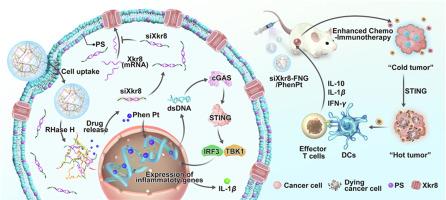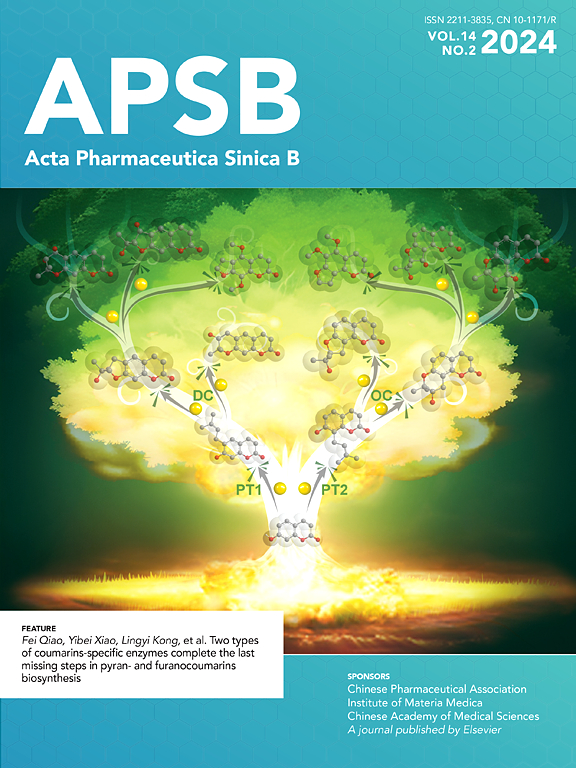Nucleic acid-based delivery system delivering platinum drugs cooperates with siRNA for potentiated chemo-immunotherapy by reducing phosphatidylserine exposure and activating the cGAS–STING pathway
IF 14.6
1区 医学
Q1 PHARMACOLOGY & PHARMACY
引用次数: 0
Abstract
Chemotherapeutic drugs, such as cisplatin and phenanthriplatin (PhenPt), as STING agonists to induce DNA damage and activate the cyclic GMP–AMP synthase-stimulator of interferon genes (cGAS–STING) signaling pathway provides a potential strategy for clinical chemo-immunotherapy. However, treatment with Pt-based drugs leads to irreversible ectopia of phosphatidylserine (PS), a major component of the intracellular membrane, to the surface of the cancer cells by enzymes (Xkr8). Exposed PS can bind to immune cell receptors and inhibit the presentation of tumor antigens, leading to immunosuppression and attenuation of chemotherapy. Herein, we report a novel approach to enhance chemo-immunotherapy by constructing siRNA targeted Xkr8 (siXkr8)-mediated tetrahedral framework nucleic acid nanogel structure concurrently loaded with PhenPt (siXkr8-FNG/PhenPt) for co-delivery of siRNA and Pt-based drugs. The results showed that siXkr8-FNG/PhenPt can not only be used as an efficient delivery carrier to deliver siXkr8, block the expression of Xkr8, reduce the exposure of PS on the cancer cells surface, but also act as an immune stimulant to activate cGAS–STING pathway, effectively improve the immunosuppressive microenvironment, produce antitumor immune response, and inhibit tumor growth and metastasis. Overall, this new delivery system is important for improving the effect of Pt-based drug chemotherapy, inducing immune enhancement and nucleic acid drug delivery.

基于核酸的铂类药物递送系统通过减少磷脂酰丝氨酸暴露和激活cGAS-STING通路,与siRNA合作进行强化化学免疫治疗
化疗药物如顺铂和非那西铂(PhenPt)作为STING激动剂诱导DNA损伤,激活干扰素基因环GMP-AMP合成酶刺激因子(cGAS-STING)信号通路,为临床化疗免疫治疗提供了一种潜在的策略。然而,以pt为基础的药物治疗导致细胞膜的主要成分磷脂酰丝氨酸(PS)通过酶(Xkr8)不可逆地异位到癌细胞表面。暴露的PS可以与免疫细胞受体结合,抑制肿瘤抗原的呈递,导致免疫抑制和化疗的衰减。在此,我们报道了一种新的方法,通过构建siRNA靶向Xkr8 (siXkr8)介导的四面体框架核酸纳米凝胶结构,同时装载PhenPt (siXkr8- fng /PhenPt),以共同递送siRNA和基于pt的药物,从而增强化学免疫治疗。结果表明,siXkr8- fng /PhenPt不仅可以作为高效的递送载体递送siXkr8,阻断Xkr8的表达,减少PS在癌细胞表面的暴露,还可以作为免疫刺激剂激活cGAS-STING通路,有效改善免疫抑制微环境,产生抗肿瘤免疫应答,抑制肿瘤生长和转移。综上所述,这种新的给药系统对于提高基于pt的药物化疗效果、诱导免疫增强和核酸给药具有重要意义。
本文章由计算机程序翻译,如有差异,请以英文原文为准。
求助全文
约1分钟内获得全文
求助全文
来源期刊

Acta Pharmaceutica Sinica. B
Pharmacology, Toxicology and Pharmaceutics-General Pharmacology, Toxicology and Pharmaceutics
CiteScore
22.40
自引率
5.50%
发文量
1051
审稿时长
19 weeks
期刊介绍:
The Journal of the Institute of Materia Medica, Chinese Academy of Medical Sciences, and the Chinese Pharmaceutical Association oversees the peer review process for Acta Pharmaceutica Sinica. B (APSB).
Published monthly in English, APSB is dedicated to disseminating significant original research articles, rapid communications, and high-quality reviews that highlight recent advances across various pharmaceutical sciences domains. These encompass pharmacology, pharmaceutics, medicinal chemistry, natural products, pharmacognosy, pharmaceutical analysis, and pharmacokinetics.
A part of the Acta Pharmaceutica Sinica series, established in 1953 and indexed in prominent databases like Chemical Abstracts, Index Medicus, SciFinder Scholar, Biological Abstracts, International Pharmaceutical Abstracts, Cambridge Scientific Abstracts, and Current Bibliography on Science and Technology, APSB is sponsored by the Institute of Materia Medica, Chinese Academy of Medical Sciences, and the Chinese Pharmaceutical Association. Its production and hosting are facilitated by Elsevier B.V. This collaborative effort ensures APSB's commitment to delivering valuable contributions to the pharmaceutical sciences community.
 求助内容:
求助内容: 应助结果提醒方式:
应助结果提醒方式:


